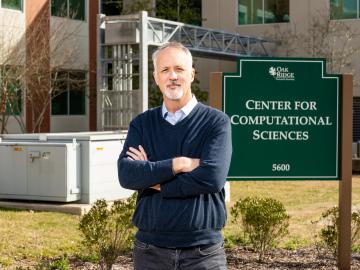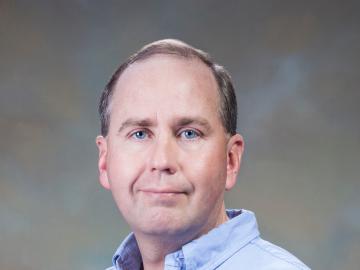
Filter News
Area of Research
- Advanced Manufacturing (1)
- Biology and Environment (14)
- Computational Engineering (1)
- Computer Science (4)
- Electricity and Smart Grid (1)
- Energy Science (12)
- Fuel Cycle Science and Technology (1)
- Functional Materials for Energy (1)
- Fusion and Fission (1)
- Fusion Energy (1)
- Isotopes (1)
- Materials (9)
- Materials for Computing (1)
- National Security (41)
- Neutron Science (6)
- Supercomputing (49)
News Topics
- (-) Frontier (64)
- (-) Machine Learning (68)
- (-) National Security (86)
- 3-D Printing/Advanced Manufacturing (146)
- Advanced Reactors (40)
- Artificial Intelligence (131)
- Big Data (79)
- Bioenergy (112)
- Biology (128)
- Biomedical (73)
- Biotechnology (39)
- Buildings (74)
- Chemical Sciences (86)
- Clean Water (33)
- Composites (35)
- Computer Science (226)
- Coronavirus (48)
- Critical Materials (29)
- Cybersecurity (35)
- Education (5)
- Element Discovery (1)
- Emergency (4)
- Energy Storage (114)
- Environment (218)
- Exascale Computing (67)
- Fossil Energy (8)
- Fusion (66)
- Grid (74)
- High-Performance Computing (130)
- Hydropower (12)
- Irradiation (3)
- Isotopes (62)
- ITER (9)
- Materials (157)
- Materials Science (158)
- Mathematics (12)
- Mercury (12)
- Microelectronics (4)
- Microscopy (56)
- Molten Salt (10)
- Nanotechnology (64)
- Neutron Science (171)
- Nuclear Energy (122)
- Partnerships (68)
- Physics (69)
- Polymers (35)
- Quantum Computing (53)
- Quantum Science (93)
- Security (31)
- Simulation (65)
- Software (1)
- Space Exploration (26)
- Statistics (4)
- Summit (71)
- Transportation (103)
Media Contacts

The Oak Ridge Leadership Computing Facility’s Matt Sieger has been named the project director for the OLCF-6 effort. This next OLCF undertaking will plan and build a world-class successor to the OLCF’s still-new exascale system, Frontier.

With the world’s first exascale supercomputing system now open to full user operations, research teams are harnessing Frontier’s power and speed to tackle some of the most challenging problems in modern science.

As renewable sources of energy such as wind and sun power are being increasingly added to the country’s electrical grid, old-fashioned nuclear energy is also being primed for a resurgence.

A trio of new and improved cosmological simulation codes was unveiled in a series of presentations at the annual April Meeting of the American Physical Society in Minneapolis.

Using disinformation to create political instability and battlefield confusion dates back millennia. However, today’s disinformation actors use social media to amplify disinformation that users knowingly or, more often, unknowingly perpetuate. Such disinformation spreads quickly, threatening public health and safety. Indeed, the COVID-19 pandemic and recent global elections have given the world a front-row seat to this form of modern warfare.

ORNL has named Michael Parks director of the Computer Science and Mathematics Division within ORNL’s Computing and Computational Sciences Directorate. His hiring became effective March 13.

Four nuclear nonproliferation staff members from the Department of Energy’s Oak Ridge National Laboratory were recognized as part of the 2021 Outstanding Security Team awarded by the Secretary of Energy for contributions to the Material Control and Accountability Technical Qualification Program Pilot.

Stephen Dahunsi’s desire to see more countries safely deploy nuclear energy is personal. Growing up in Nigeria, he routinely witnessed prolonged electricity blackouts as a result of unreliable energy supplies. It’s a problem he hopes future generations won’t have to experience.
The Autonomous Systems group at ORNL is in high demand as it incorporates remote sensing into projects needing a bird’s-eye perspective.

A team of researchers from ORNL has created a prototype system for detecting and geolocating damaged utility poles in the aftermath of natural disasters such as hurricanes.


